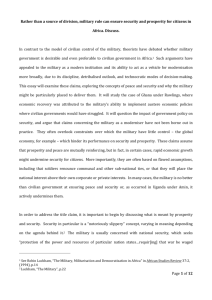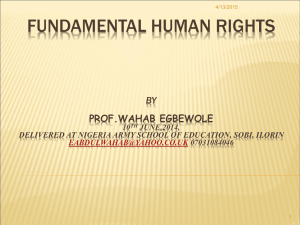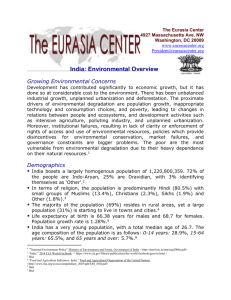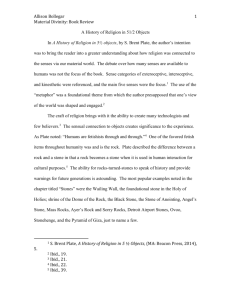military (1)
advertisement
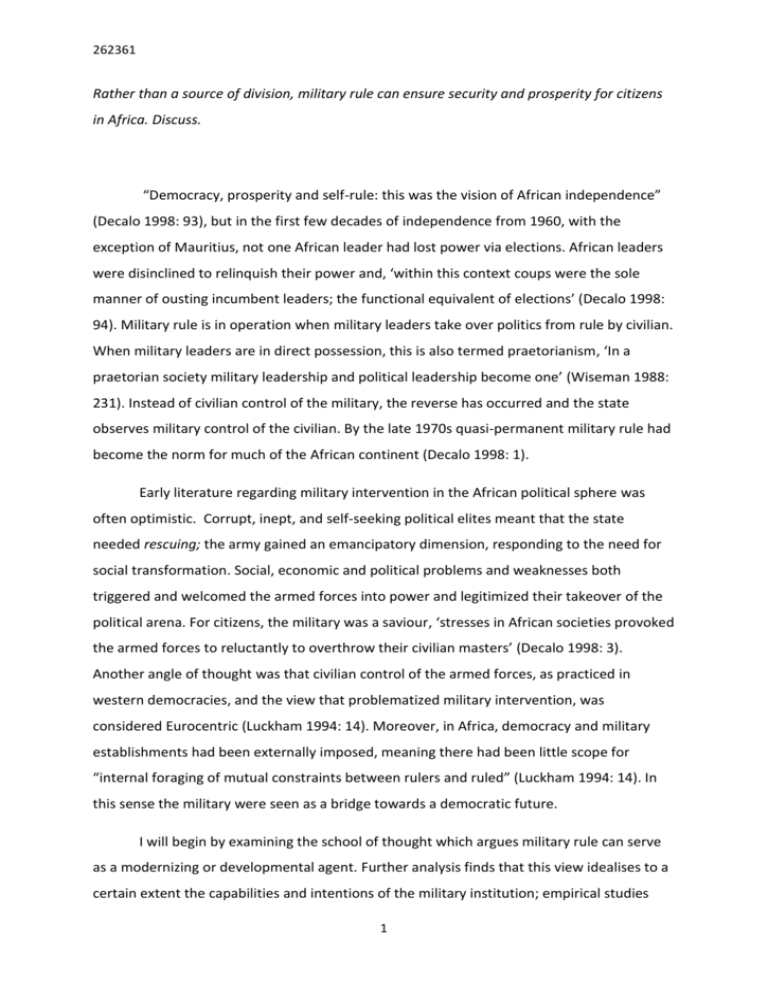
262361 Rather than a source of division, military rule can ensure security and prosperity for citizens in Africa. Discuss. “Democracy, prosperity and self-rule: this was the vision of African independence” (Decalo 1998: 93), but in the first few decades of independence from 1960, with the exception of Mauritius, not one African leader had lost power via elections. African leaders were disinclined to relinquish their power and, ‘within this context coups were the sole manner of ousting incumbent leaders; the functional equivalent of elections’ (Decalo 1998: 94). Military rule is in operation when military leaders take over politics from rule by civilian. When military leaders are in direct possession, this is also termed praetorianism, ‘In a praetorian society military leadership and political leadership become one’ (Wiseman 1988: 231). Instead of civilian control of the military, the reverse has occurred and the state observes military control of the civilian. By the late 1970s quasi-permanent military rule had become the norm for much of the African continent (Decalo 1998: 1). Early literature regarding military intervention in the African political sphere was often optimistic. Corrupt, inept, and self-seeking political elites meant that the state needed rescuing; the army gained an emancipatory dimension, responding to the need for social transformation. Social, economic and political problems and weaknesses both triggered and welcomed the armed forces into power and legitimized their takeover of the political arena. For citizens, the military was a saviour, ‘stresses in African societies provoked the armed forces to reluctantly to overthrow their civilian masters’ (Decalo 1998: 3). Another angle of thought was that civilian control of the armed forces, as practiced in western democracies, and the view that problematized military intervention, was considered Eurocentric (Luckham 1994: 14). Moreover, in Africa, democracy and military establishments had been externally imposed, meaning there had been little scope for “internal foraging of mutual constraints between rulers and ruled” (Luckham 1994: 14). In this sense the military were seen as a bridge towards a democratic future. I will begin by examining the school of thought which argues military rule can serve as a modernizing or developmental agent. Further analysis finds that this view idealises to a certain extent the capabilities and intentions of the military institution; empirical studies 1 262361 show the army has failed to transform societies in Africa economically and politically in the way supporters of military intervention imagined. Rather than instigating progression and modernization, Mazrui has argued military rule can lead to a retraditionalization and reAfricanization of Africa. Furthermore, military rule has exacerbated rather than relieved the following divisions that have characterized African society: gender; ethnic and regional; mass-elite gap. Rather than providing security and prosperity, military rule has slowed the progress towards democracy and hindered economic development. The analysis of military rule in the essay will be grounded on the realities of Nigeria, the most populous nation in Africa. Nigeria’s political history reveals successive cases of praetorianism- when militaries take over political structures. The military organisation originally created by the British colonial government in Nigeria was based on the Sandhurst formula of the political neutrality of the military (Luckham 1971: 1). After less than 6 years of independence, in 1966 the civilian regime was overthrown by a military coup. Since then, one wing of the military has subsequently been displaced by another – in July 1966, 1975, and 1985 (Tordoff 2002: 177). A close study of Nigeria reveals the societal effects of ethnic cleavages within the military, the political neglect of women in patriarchal structures and the painful struggle to make the transformation to democracy. In his 1961 essay, “Armies in the Process of Political Modernization”, Lucian W. Pye argued that the military is a ‘vigorous champion of progress and development’ (Pye 1961: 83). Pye researched the role of the military in the political development of new states and argued that for the underdeveloped regions, ‘the military might become the critical group in shaping the course of nation-building’ (ibid: 82). Pye envisions a political realm whereby ‘rational’ and ‘politically conscious officers’ are ‘aware of the need for substantial changes in their won societies’ and are ‘extremely sensitive to the extent to which their countries are economically and technologically underdeveloped’ (ibid: 85-86). The army’s westernised form of organisation is similar to the most highly industrialised civilizations, making the army ‘the most modernized organization in the society’ (ibid: 92). Soldiers have access to advanced western technology, which makes them sensitive to the needs of modernization and technological advancement. They also obtain in the army a level of education makes them ‘modernized men’, in tune with intellectuals and students (ibid: 86). The army also 2 262361 provides a model of meritocracy for society to follow, with ‘channels for upward social mobility’ (ibid: 90). In Pye’s essay the army is depicted as a nationalising force. Men leave behind their primitive origins and enter the ‘more impersonal world of the army’ where they learn to identify with ‘a larger political self’ (Pye 1961: 88). Ethnic divisions are diminished as soldiers learn that they ‘stand in some definite relationship to a national community’ and develop ‘goals of nationalism’ (ibid: 89). Controversially, he perceives the distance of army officers from their civilian societies as a positive factor of military rule, since it allows for objective judgement and comparisons to be made with the standards of the industrialised world. Although Pye makes interesting hypotheses about the modernizing capabilities of the military, he allows a high degree of armchair theorizing, failing to provide in-depth empirical case studies to support his theories. Empirical evidence reveals substantial flaws in his arguments and suggests that African armies have not created better leaders than the civilian regimes they overthrew. Decalo writes, ‘Military juntas by and large are either as incompetent as ruling hierarchies or incapable of effecting change’; their economic and social policies or abilities do not fare better than those of civilian regimes and they are rarely freer of corruption (Decalo 1976: 24). Theorists of the modernization literature often idealise the motives for military coups, which are rarely simple. There may be a personalist seizure of power such as the case of Lt. Samuels in Ghana, who aimed to become the first lieutenant Head of State in Africa (ibid: 19). The factors that infringe on an authoritarian’s ability to rule effectively reach military generals, ‘greed and avarice know no distinction between soldier and civilian’ (ibid: 24-25). Perhaps Pye overestimates the will and ability of soldiers returning from military training overseas to return, intervene and “tidy up the mess” and ‘to create a new political order (ibid: 14). Mazrui questioned the social scientists expressing the belief the armed forces were agents of modernization. His essay, “Soldiers as Traditionalizers”, contests that the military has modernizing capabilities which, ‘change the rest of the society away from traditionalist preconceptions and toward a pattern of behaviour more characteristic of modern societies’ (Mazrui 1977: 247). Commentators have often discerned a ‘conservative streak in the military mind’, observing that the armed forces esteem discipline, rigor, orders and 3 262361 predictability and are relatively insulated from outside ideas. However, according to Mazrui, this has largely been ignored when analysing the role of the armed forces in Africa (ibid: 250). Unlike Pye’s conception of the modern soldier, Mazrui alerts us to the fact that armies in developing countries tend to recruit from some of the least privileged sectors of the population. These ‘peasant warriors in uniform’ may be less acculturated than urbanized secondary school graduates; even the officers who receive further training do not reach the level of normative westernization than civilian university graduates. Mazrui adds that officers’ comparatively lower intelligence may have a political cost to rational policy making (ibid: 256). Soldiers and military leaders may play a traditionalizing role for Africa. Mazrui suggests that whilst the military organization itself may be and ‘logical with regard to systems of co-ordination’ and technologically advanced, individual soldiers remain ‘steeped in primordial beliefs and traditionalist tendencies (ibid: 252). Through the partial resurrection of indigenous cultural ways, the soldiers may prove to be greater agents for retraditionalization and the re-Africanization of Africa than their civilian predecessors. For example, Idi Amin of Uganda brought in his traditional beliefs in occult powers into politics (ibid: 257). Mazrui doubts that it is good for political culture to have such beliefs resurrected. However Mazrui is not able to determine if this aspect of traditionalization is pronounced in civilian rule. The individual soldier may also not embrace a national identity as Pye hypothesized. Another aspect of retraditionalization under military rule is retribalization, that is military rule may aggravate ethnic resurgence. Certain communities were commonly excluded as warriors during colonialism, either because they feared resistance from them if armed, or because of a perceived lack of physical strength and other ‘fighting qualities’ (ibid: 258). An example is the Baganda in Ethiopia, since they were regarded as a martial community the colonialists were reluctant to recruit them into the armed forces. Mazrui looked at the repercussions of this divisive action in the relations between soldiers and civilian after independence. Many theorists claim colonialists politicised tribes (ibid: 260). Stereotypes were formed within communities about other ethnic communities and within the army itself. In Nigeria this also affected relations within the military itself- since the Ibo tribe had not been categorized as a martial race Northern officers were reluctant to take orders from 4 262361 them (ibid: 260). Mazrui concludes that the military may be more ‘bedevilled by ethnic factors than a situation of civilian politics’ (ibid: 262). Decalo confirms that soldiers in reality rarely embrace a national identity, ‘African armies have rarely been cohesive, nontribal, Westernized, or even complex organizational structures’ (Decalo 1976: 14). Although Pye points to the neat hierarchical command structure in armies as models of meritocracy to wider society, these often just mask deep cleavages that reflect wider societal chasms. ‘Differential recruitment and promotion patters cause tensions that reinforce other lines of division based on rank, age, tribe, and education’ (ibid: 14). Instead of resembling a complex organisation model, armies are ‘a coterie of distinct armed camps owing primary clientelist allegiance to a handful of mutually competitive officers of different ranks seething with a variety of corporate, ethnic, and personal grievances’ (ibid: 14) In Uganda, General Idi Amin dismantled the entire officer corps to exclude potential rivals, while bringing in members of ethnic minorities loyal to himself (Luckham 1994: 38). Overall, there may not be modernization in military structures; military rule may only draw society back to destabilization. Looking at our case study reveals that armies are not as untainted and neutral as Pye suggests. Luckham explores the ethnic and regional cliques within the army in detail in his study of the military revolts in Nigeria of 1966. Pye postulated simple relationships between military professionalism and modernity, but Luckham’s study argues that, ‘it was precisely the military’s bureaucratic and professional attributes that accelerated its fracture into ethnic and regional cliques’ (ibid: 15). When the army revolted against the civilian regime in the coup of January 1966 they violated the Sandhurst formula of the political neutrality of the military (Luckham 1971: 1). Once in power, the army began to fragment and pressure from the primordialisms of tribe and region caused discipline to break down. By July 1966 conflict had broken out between the officers of different regions and ethnic groups. Many officers were subsequently killed and the nation divided into hostile parts causing the civil war in July 1967 (ibid: 1). Not only did the military fail to nationalise soldiers and diminish ethnic divisions, the military organisation itself broke down and internal strife led to civil war. Whilst seemingly protected by professional loyalties and the army’s unity of structure, boundaries were broken by ethnic or regional loyalties (ibid: 177). 5 262361 Pye’s analysis of the military suffered from a series of overestimations regarding the modernizing capabilities of armies; the altruistic purposes of military generals and their potential to ‘save’ a country from its political failings; soldiers as modernizing agents with regards to their education, rejection of primordial beliefs and nationalizing goals; the structure of unity vaunted by armies that may cloak problematic cleavages and ethnic loyalties. It is interesting that omitted from Mazrui’s discussion of military rule as a modernizing or retraditionalizing force is the discussion of women. The gender division within African societies is seldom touched upon in the literature of military rule, which is a patriarchal system of governance. I will now address whether male-dominated military governments form policies which enhance or diminish the status of women. Do they provide more educational and economic opportunities or access to political power than elected representative governments? I will again use the case study of Nigeria where, ‘there is a huge disparity in the socio-economic development of the genders’, revealed in literacy rates, population in the labour force and the negligible participation of women in politics (Omonubi-McDonnell 2003: 01). Since women make up over fifty per cent of Nigeria’s population, it is divisive that women throughout military rule constituted a negligible part of the armed forces. Mba researched the implications of the militarization of the state for women in Nigeria, examining each military regime and using the First Republic, 1960 to 1965, as a basis for comparison. After the First Republic was deposed by Nigeria’s first military coup in 1966, the Federal Military Government was formed with Major-General Ironsi as the Head of State. During his leadership, all political leaders were excluded from participation in the government. Mba notes that this action did not deprive women of any power since they had none in the First Republic, ‘women were not in the armed forces, civil service or in the professions to begin with’ (Mba 1989: 71). When Gowon was head of state (1966-75), Mba argues at this time political power was more centralized than ever before, and as a result, ‘Military service becomes more isolated from the people they were supposed to govern. With no women at any level of government, the military was indeed very remote from women (ibid: 72). The third military coup brought General Murtala Mohammed into power in 1975. Shortly after he was assassinated and his deputy Lt. General Olusegun Obasanjo continued his policies of the demilitarization of the political system, and the demobilization 6 262361 of the army, setting a date to terminate military rule. Under Obasanjo things improved for women slightly in terms of representation in government. Mba found, ‘at state level, it appears to have been the unofficial policy that there should be one woman commissioner in each state’ (ibid: 75). Obasanjo’s military regime also brought the right to vote for women in the Northern States, twenty years after those on the south. It appears that political involvement improved slightly for women under Obasanjo’s rule. Overall, Mba concluded that although some military rulers provided a little transformation within society, where the civilian leaders did not, this was not due to a commitment to improving the rights of women. Obasanjo reportedly once said, ‘While we want our women to be fully involved in our national life, we also want them to take care of our homes’ (ibid: 75), overall, ‘in the view of the military government, the opinion of women was neither relevant nor necessary’ (ibid: 75). We may question whether it is possible for an organisation, which is inherently patriarchal and largely excludes the participation of women, to protect their interests or be perceived as a modernizing force. Luckham writes, military and security bureaucracies ‘embody ideological relations between male protectors and female protected […] reinforcing the social and political marginality of women within the state all the more so under military or authoritarian governments, whose social base in the armed forces has almost by definition excluded women from key power positions (Luckham 1994: 23). When a state is governed under a patriarchal system, women have little voice. Omonubi-McDonnell claims it is their political powerlessness which retards their political, economic and social development (Omonubi-McDonnell 2003: 01). In the long run, being governed by unelected, self-imposed military personnel has had serious implications on women’s political involvement and women’s right have gone unprotected. Laws exist which mitigate against the advancement of women and ‘perpetrate the gap of inequality between the sexes’ (ibid: 05) and female genital mutilation is practiced in most parts of the country. The discussion of women highlights the powerlessness of groups within society to make changes under military rule. Some regimes are noted for their disrespect for the rule of law, serious corruption, human rights abuse and massive looting of the national treasury (ibid: 62), but military regimes are unelected and accountable to no one. Military intervention was 7 262361 often welcomed and justified on the basis that military regimes would hand over power back to civilian elites once they had created a new political order. The optimism for military intervention was originally based on the idea of the ‘effectiveness of armies in promoting national development and eventually democratic practices’ (Pye 1961: 83). Can the military somehow be part of the democratic process? Some theorists have argued that the military can play a role in providing the necessary stability and order that makes democracy possible, but can the seizure of power through undemocratic means lead to a stable and democratic future? In reality military rulers in Africa rarely relinquish their power and step down. During the 60s and 70s the inexorable trend was ‘toward the militarisation of ruling hierarchies on the continent on a permanent basis’ (Decalo 1998: 34). Governments would often come to be led by a single powerful person, and were autocracies in addition to military dictatorships, for example Idi Amin in Uganda, Sani Abacha in Nigeria and Muammar Gaddafi in Libya. Military regimes even created institutional and structural avenues for their re-entry into political reckoning (Nwankwo 1996: 30). Military rulers like Babangida in Nigeria, ‘have placed obstacles in the way of democratic openings at every turn’ (Luckham 1994: 64). Nwankwo looks into the 1993 military intervention in Nigeria’s political process in 1993, an action which constituted a ‘betrayal of democracy’ (Nwankwo 1996: 30). The military Head of State, Babangida, publicly committed himself to making the transition to democracy in 1986 (Ihonvbere 1996: 197), but after an elaborate 8-year transfer process and the June 1993 presidential elections that were widely proclaimed to be the best the nation had ever had, the General announced that the elections were annulled and banned the candidates from any further presidential contests, thus derailing the transition to democracy. Ihonvbere doubts whether the military leaders had any intention of handing over power to the politicians (ibid: 198). The General had controlled the elections, sent death threats to dissidents, forced press closure and ignored public opposition and privately embarked on a ‘sinister programme that involved dismantling institutions of civil society, entrenching arbitrary rule, and totally militarizing the political landscape’ (ibid: 198), denying the empowerment of the people and their communities. His actions were set to prevent popular involvement in the evolution of government and society in Nigeria. 8 262361 Nwankwo writes, the ‘Nigerian Military is incapable of governing civil society, of implementing positive restructuring of the Federal polity, and of leaving behind a legacy of enduring and sustainable democratic order (Nwankwo 1996: 31). Military rule does not therefore always enable a swift transformation to democracy. This essay has highlighted how military rule has been a source of ethnic, regional and gender division within countries in Africa. On the whole military regimes have failed to promote security and prosperity for citizens to a greater extent than civilian rulers, since divisions have led even to civil war, as in the case of Nigeria, and to the almost total exclusion of women from politics and a lack of commitment to women’s rights. Military organisations themselves fail to create a new political order since they themselves are part of the problem- they are patriarchal establishments entrenched in deep ethnic cleavages, allowing for authoritarian rule and a mass-elite gap. Furthermore, Military rule itself is not only undemocratic but is unlikely to precipitate a neat transition to democracy. The few who benefit significantly under military rule may be those with clientelist relations with the key officers in power, but even this security may only last until the next military coup, ‘coups are more likely in states where major plots and coup attempts have already occurred’ (Luckham 1994: 31). Nigeria for example has witnessed eleven coup d’etats, which have hardly brought stability to the political arena (Igbuzor 2005: 103). Military governments may devote more time and effort to consolidating and warding off alternative challenges to their authority than to providing the country with purposeful leadership (Luckham 1976: 15). Complete military disengagement from politics and a commitment to the process of democratization is essential if African citizens are to gain security and prosperity. Political power must be transferred from a small ruling class to the mass of the African people in a democratic system that will promote ‘the continuing responsiveness of the government to the preferences of its citizens considered as political equals’ (Nwabueze 1993: 75). 9 262361 10 262361 Bibliography Decalo, S., 1976. Coups and Army Rule in Africa. London: Yale University Press. Decalo, S., 1998. Civil-Military Relations in Africa. Gainesville: Florida Academic Press. Igbuzor, O., 2005. Perspectives on Democracy & Development. Lagos, Nigeria: Joe Tolalu & Associates. Ihonvbere, J.O., 1996. Are Things Falling Apart? The Military and the Crisis of Democratisation in Nigeria. The Journal of Modern African Studies, 34(2), pp.193-225. Luckham, R., 1971. The Nigerian Military: A Sociological Analysis of Authority and Revolt 1960-67. Cambridge: Cambridge University Press. Luckham, R., 1994. The Military, Militarization and Democratization in Africa. African Studies Review, 37(2), pp.13-76. Mazrui, A.A., 1977. Soldiers as Traditionalizers: Military Rule and the Re-Africanization of Africa. Journal of Asian and African Studies. 12(4), pp.236-258. Mba, N.E., 1988. Kaba and Khaki: Women and the Militarized State in Nigeria. In: Parpart, J.L and Staudt, K.A, ed. 1989. Women and the State in Africa. London: Lynne Reiner Publishers. pp.69-90. Nwabueze, B. O., 1993. Democratisation. London: Spectrum Law Series. Nwankwo, A.A., 1996. Nigerians as Outsiders: Military Dictatorship and Nigeria’s Destiny. Enugu, Nigeria: Fourth Dimension Publishing Co. Ltd. Odetola, T.O., 1978. Military Politics in Nigeria: Economic Development and Political Stability. New Brunswick, N.J: Transaction Books. Omonubi-McDonnell, M., 2003. Gender Inequality in Nigeria. Oxford: African Books Collective Ltd. Parpart, J.L and Staudt, K.A., 1989. Women and the State in Africa. London: Lynne Reiner 11 262361 Publishers. Pye, L.W., 1961. Armies in the Process of Political Modernization. European Journal of Sociology, 2, pp.82-92. Tangri, R. and Mwenda, A.W., 2003. Military Corruption and Ugandan Politics since the late 1990s. Review of African Political Economy, (30)98, pp.539-552. Tordoff, W., 2002. Government and Politics in Africa. 4th ed. Hampshire: Palgrave Macmillian. Wiseman, John A., 1988. Militarism, Militarisation and Praetorianism in South Africa. Journal of the International African Institute, 58(2), pp. 230-233. 12

